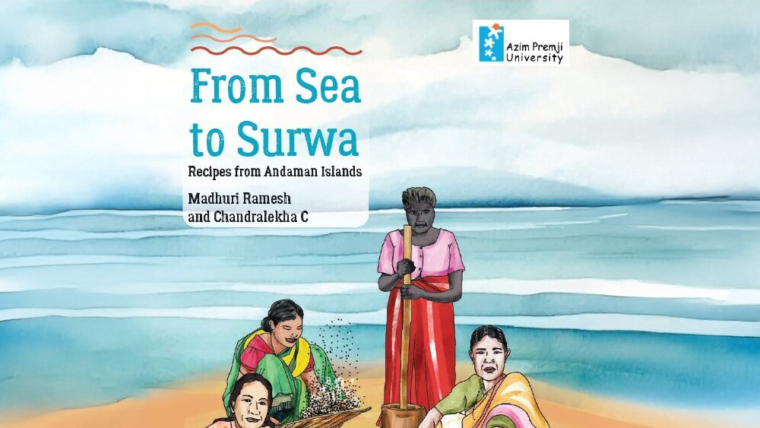The uniqueness of India and its Indianness lies in its natural diversity. The ancient sages and saints made efforts to bind man with nature. Since ancient times, poets have composed verses in Telugu language with nature as the focal point. In Telugu literature, animals like snakes, spiders and elephants were shown crossing the boundaries of devotion. The epic Kalahastishwara Mahatmyam Kavya, written by Dhurjati, the court poet of Sri Krishna Devaraya, is an example. Humans learnt the form of Satvik Bhakti from Shri (Spider), Kaala (snake) and Hasti (elephant), which are not domestic creatures.
Every creature of the forest, whether it is a tree, animal or bird, was a forest deity in Dhurjati’s view. In the verses of this respected poet, water, rocks and mountains that were considered sacred were celebrated and their beauty was minutely captured. The people of Telugu Nadu celebrated their relationship with nature.
But time started changing. The changes that have come in modern humans are the result of the destruction of nature. Due to man’s selfishness, life that was in tune with the natural world changed drastically. It has resulted in pollution exploding in different forms. Modern poets have depicted this misconduct of humans against nature.
In contemporary poetry, poets like Vishwanath Satyanarayana, Rayaprolu Subbaravu, Devulapalli Krishna Shastri, Gurram Jashua, Venkateswara Parvatish Kavi, Nayani Subbaravu, Vedula Satyanarayana, Srirangam Srinivasaravu, Arudra, and Narayana have depicted the movement. Like the Hindi Chhayavadi poets, the Telugu Bhaav poets connected human emotions with nature, making it the main part of their poetic creations.
After Bhaav Kavita (romantic poetry), Abhyudaya Kavita (progressive poetry), which is famous as Pragatisheel Kavita in Hindi, emerged. Due to this, instead of the subtle form of nature, the struggle of humans for existence started getting expressed in Telugu literature. Since then, nature has become a secondary thought in poetry, and the frustrations of humans, their struggles, and their dissatisfactions have become the main subjects.
The lack of public welfare sentiment in the poet and individualistic thinking kept poetry away from nature. In Abhudayavadi poetry which was developed after Bhaav Kavita, instead of the pleasant face of nature, the poets started to depict its vigorous forms. The poets also started to express their anger and struggle with the natural world as a tool. In the era of globalisation, due to mutual competition among countries and economic progress, humans forgot the very essence of humanity.
The efforts of the sages and saints towards the protection of nature for centuries have become ineffective today. At present, it is essential to free humans from their distorted mentality. There is a need to awaken his deep bond with nature again.
This assumption of absolute power of humans over nature has led to the disappearance of the ideology of the poet. Therefore, in modern poetry, most poets focus entirely on the self. The individual gains importance and the collective takes a backseat. The attention is on the individual’s pain, frustrations and ego. The verses that describe the beauty of a bloom and the passing of seasons are nowhere to be seen in modern poetry.
However, some contemporary poetry connects to nature from a different angle. The need for environmental protection is gradually being recognised in Telugu literature, which is creating awareness among readers about environmental degradation and the effects of pollution. Bengal Saidachari’s poem Na Palli (My Village) presents a view of a village, full of trees, plants and agricultural fields which draws a reader to the contentment that prevails in the people when surrounded by green.
Much earlier, Jandhyala Papayy Sastri had described nature as the natural teacher of humans and the benefits of trees. Trees, which bear the burning heat on the head and give cool shade to the travellers, which grow even on hard rocks and give fruits and flowers, which give their bodies to be cut even after sacrificing their lives, which makes the human race understand the altruism in this world, are his Guru”.
It has the message of learning from the altruistic, selfless intelligence of trees. Papineni Sivasankar, in his poem Aakupachchani Lokam (Green World), portrays trees of the dense forest as the forest deities guiding human life.
Modern human societies originated and thrived on the river banks where culture flourished. Dr. Mohammad Sharif, while describing the state of rivers today, requests the human community to save water from getting polluted. In the poem Prakritini Rakshinchu (Protect Nature), he writes:
“By releasing polluted water into drains, diseases are spreading, the essence of the earth is getting depleted and life span is decreasing, agriculture has weakened, cattle wealth has decreased, water pollution has spread. Stop it now, O man! Protect this earth”.
Humans’ ego, selfishness and greed has destroyed the environment. Poet Siricilla Gafoor Shikshak in his poem Pranulu-Paryavaran writes, If you spit on the sky, it will fall on you, nature’s anger will burn you like a curse, it is ego, which will drown man like a catastrophe, it is selfishness that makes the lives of creatures questionable.
In present times, environmental consciousness has seeped into Telugu literature. The contribution of Telugu poets in this direction is commendable.
A version of this text first appeared in Down to Earth.
Dr. Chitti Annapurna is a professor and head of the Department of Hindi at Madras University.



